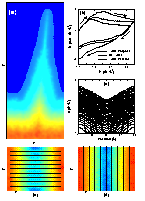Vortex Plastic Dynamics in Twinned Superconductors
We present simulations, without electrodynamical assumptions, of
B(x,y,H(t)), M(H(t)), and
Jc(H(t)), around twin-boundary (TB) planes in hard
superconductors, for a variety of twin-boundary pinning potential parameters,
and for a range of values of the density and strength of the pinning sites.
These simulations relate macroscopic measurements (e.g, M(H),
"flame" shaped Bz(x,y) profiles, and easy-flow along a
TB) with the microscopic pinning landscape. We numerically solve the overdamped
equations of motion of up to 10^4 flux-gradient-driven vortices which can be
temporarily trapped at about 10^6 pinning centers.

Click on the figure for a full-sized version, with text.
J. Groth, C. Reichhardt, C. J. Olson, S. Field, Franco Nori
Published in Physical Review Letters 77, 3625 (1996).
A Hi-res (640x400) vortex flame movie (1.9 Meg)
is available.
A smaller (320x200) version of the above
is recommended for Macs.
- The left panel of the movie shows the averaged flux density as
the magnetic field outside the sample is increased; the right
panel shows the actual vortex locations. Vortices enter the sample
from the bottom of the figure. The sample contains a single
twin boundary which acts as an easy-flow channel for flux motion.
Vortices escape from the twin boundary, producing the flame pattern.
Both are in the
cross-platform QuickTime format.
The paper's source
(RevTeX, PostScript figures tar'ed and gzipped).
A PostScript version of the paper is also available.
Go to QuickTime movie page.
Return to main page.
Created by: Jared Groth and Bartholomew Hsu
Last modified: 3/7/97

